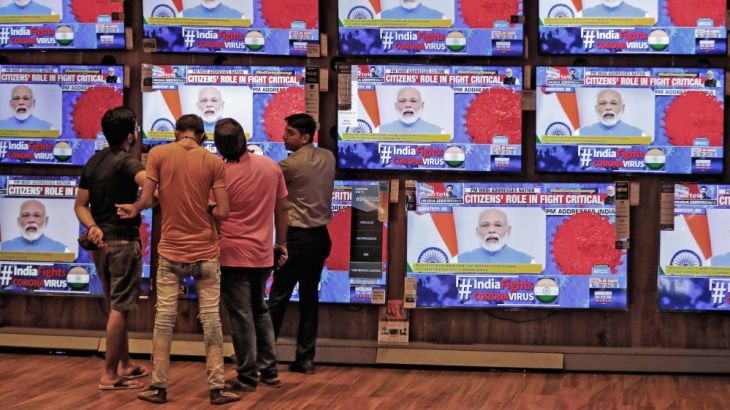Q&A: Senior Indian journalist Hartosh Singh Bal
Al Jazeera speaks to Hartosh Singh Bal, political editor of Caravan magazine, on the state of media and democracy.

New Delhi, India – India’s Hindu nationalist government has been criticised for silencing dissent and undermining independent media, with critical journalists branded “anti-nationals” or charged under “anti-terror” laws.
Under Prime Minister Narendra Modi, press freedom has deteriorated, with India dropping to 142nd place in the list of 180 countries in “the World Press Freedom Index 2020”.
Keep reading
list of 3 itemsKashmir journalist charged for ‘anti-national’ social media posts
Journalism in Kashmir in ‘state of repression’: Media watchdog
Newspapers and television networks critical of the governments have either had their advertisements blocked or their offices raided, and activists have been thrown in jails for organising peaceful protests.
It has resulted in widespread self-censorship on the part of media. A sectarian agenda, critics said, have instead been accorded more prime-time slots in tune with the Hindu nationalist government’s right-wing politics.
|
|
Modi himself has not conducted a single news conference since becoming prime minister in 2014.
Before an abrupt decision to announce a coronavirus lockdown on March 24, Modi met editors and owners of 20 major media organisations asking them to publish “positive stories”. The government also tried to control all aspects of information regarding the coronavirus crisis.
Al Jazeera spoke Hartosh Singh Bal, political editor of Caravan magazine, on the state of media and democracy in India.
Al Jazeera: How would you describe the state of press freedom in India at the moment?
Hartosh Singh Bal: Well, it’s been going from bad to worse for a while. I think ever since Modi took over [in 2014], there’s been a deliberate attempt to subvert the whole independence of the media, and dissent has been strictly controlled.
I think just a few hours before the coronavirus lockdown [was announced on March 24], Modi himself spoke to a lot of owners and editors of print [media] across the country, and you’ve seen the results.
They [media] are basically reporting positive stories on the lockdown, and the migrant crisis was largely ignored. Historian Ram Guha’s column was removed from the English newspaper the Hindustan Times, whose owner Modi spoke to. And we are getting a lot of under-reporting on the bad impact of the lockdown and of what is happening in the country.
Al Jazeera: Why do you think media companies are so willing to comply with the government pressure?
Bal: Two things, I think. One is to do with the media landscape. The media ownership by big business and people who have other business interests already had undermined the media even during the times of the previous Congress party-led government.
But Modi after coming to power used this systemically to basically coerce media through indirect means, in terms of ease of doing business for the owners, who have other commercial interests. The government can create roadblocks or deny permissions for other businesses if the reporting is not favourable.
Also, there is a great deal of collusion. There is an ideological belief in many of the owners in whatever this government represents, so there’s both coercion and collusion in what is happening. And then the [pro-government] media itself has been used to undermine any other media that speaks up independently.
You have 9 o’clock [prime time] news shows dedicated to journalists, who are called anti-nationals, traitors and left-wing extremists simply because they are critical of the government. So this government has basically managed the media by either making it ineffective or questioning its very purpose through other media which are more amenable to what they [government] want.
Al Jazeera: How dangerous do you think it is to be calling journalists or anyone who criticises the government “anti-national”? Also, the government has charged journalists, especially in Kashmir, under the anti-terror law (UAPA).
Bal: Clearly, it’s part of the same process. Kashmir is a particularly dangerous case, the extreme case, the limit case of where India will go with the kind of things Modi is doing. Kashmir was under lockdown in a sense which preceded COVID-19 because the government wanted some political ends met.
And the reporting that came out in the mainstream Indian media was that [Kashmiri] people were actually happy about being locked down in their houses. And this despite all the facts to the contrary, as the foreign media and a few other Indian media reported.
But the mainstream narrative which people in this country believed was the narrative that the government wanted spun. That is what is happening. He [Modi] is creating a fictional world in which people are consuming reality.
And what is actually happening, the shortcomings of the government, even the normal process of democracy in which leadership and political decisions are questioned, is being undermined. There is no constant exchange except through [pro-government] media. So in some senses, the very democratic framework of India, the way it should operate, is today in peril.
Al Jazeera: Indian government leaders love to talk about how India is the world’s largest democracy. They say it all the time. But then how does that fit with the state of press freedom in India when the press is such an important part of democracy?
Bal: India today is in the danger of failing to be a constitutional democracy. I’m not claiming that Modi doesn’t enjoy democratic support. He does, even today, a huge amount.
But the very idea of constitutional democracy is mandated and functions through the work of institutions that control majoritarian tendencies, control the kind of anti-Muslim sentiments that this government is fomenting.
So constitutional democracy, for it to work, requires the checks and balances of institutions and the press. It may be a democracy in the sense that the majority rules, that the mob rules in some senses, but it is not a constitutional democracy in the real sense today.
The interview has been edited for clarity.